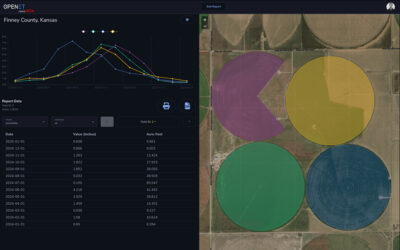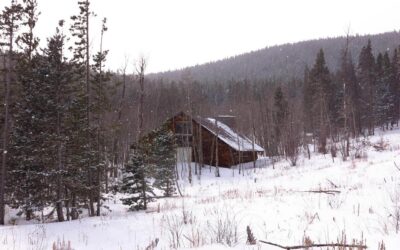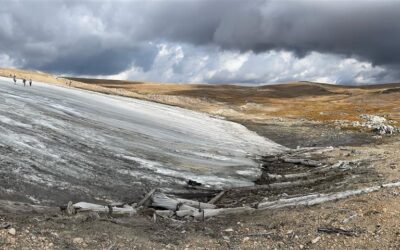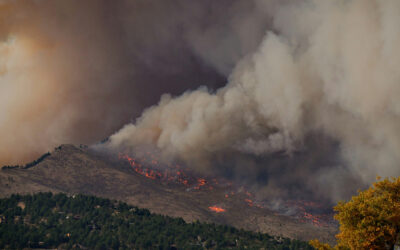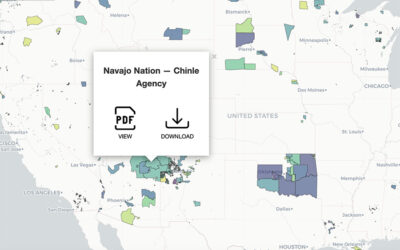News & Announcements
Working to Solve our Most Challenging Environmental Problems
DRI’s research calls on the expertise and methods of scientists from multiple scientific disciplines. More than 600 highly-skilled scientists, engineers, technicians, students, and staff work collaboratively within and across three research divisions, focused on understanding and answering critical science questions about global climate change, water quality and availability, air quality, the sustainability of desert lands, life in extreme environments, education, and more.
New Study Finds Rocky Mountain Snow Contamination
An examination of Rocky Mountain snow finds higher contamination levels of mercury and others metals in the northern part of the range, consistent with increased current and historical mining in the region. The study, published in the May issue of the journal Environmental Pollution, examined contamination levels for Mercury, Zinc, Cadmium and Antimony from nearly 50 sites in the Rocky Mountains.
FARMing with Data: OpenET Launches New Tool for Farmers and Ranchers
A NASA, DRI, and U.S. Geological Survey (USGS)-supported research and development team is making it easier for farmers and ranchers to manage their water resources. The team, called OpenET, created the Farm and Ranch Management Support (FARMS) tool, which puts timely, high-resolution water data directly in the hands of individuals and small farm operators.
New Study Traces Indigenous Population Shifts in North America Before Europeans
DRI’s Erick Robinson, Associate Research Professor of Climate and Archaeology, co-authored a new study that provides insight into North America’s Indigenous communities prior to European contact. The research found that although Indigenous populations varied regionally, the continent saw a population peak around 1150 A.D. before experiencing declines, likely stemming from drought, disease, emigration and warfare. A brief recovery around 1500 A.D. was followed by a sharp decrease upon the arrival of Europeans.
DRI Launches Statewide Science Storytelling Series
DRI announces the launch of a series of community-based events in Las Vegas and Reno that celebrate how science shapes our lives, fuels creativity, and deepens our understanding of the world by underscoring the transformative power of curiosity and knowledge. Curiosity Lab by DRI will feature DRI scientists and other guests to address some of the world’s most urgent concerns while also telling the tale of what it means to live in Nevada on the front lines of a changing climate.
Blurring the Line Between Rain and Snow: The Limits of Meteorological Classification
A new study published in Nature Communications utilizes insights gleaned from DRI’s Mountain Rain or Snow project to evaluate why traditional weather forecasting struggles to identify the rain/snow transition line. The research was possible because thousands of community members across the U.S. contributed more than 40 thousand observations of the type of precipitation falling at their location.
DRI Invites Nevada Families to Science and Literacy Events for Pre-K Students
DRI’s STEM Education Program is holding free events focused on developing literacy through engaging science activities for Pre-K children 5 and younger throughout Nevada. Through hands-on experiments, story time, and interactive games, the events will bring ecology and electricity to life for the whole family. Each child will also receive free books to take home (while supplies last).
Floods, Droughts, Then Fires: Hydroclimate Whiplash is Speeding up Globally
DRI’s Christine Albano co-authored a new study that examines how a warming climate is creating an atmosphere more prone to extreme weather. This “hydroclimate whiplash” is evident in California’s recent weather, with winters filled with repeated atmospheric river storms driving the plant growth that the dry summers then parched, providing plentiful fuel for explosive wildfires.
Ice Patches on Beartooth Plateau Reveal How Ancient Landscape Differed From Today’s
DRI scientists Joe McConnell and Nathan Chellman co-authored a new study that examines a 6,000-year-old forest preserved in a Rocky Mountain ice patch. The research, which was led by the USGS and Montana State University, used the fossil wood to develop tree-ring based temperature estimates of the mid-Holocene period. The study can provide insight into the future elevational movement of forests under climate change, the scientists say.
Kristin VanderMolen Receives 2025 Rising Researcher Award from the NSHE Board of Regents
DRI scientist Kristin VanderMolen, Ph.D., has been awarded the 2025 Rising Researcher Award in recognition of her outstanding early-career accomplishments and potential for advancing scientific knowledge in the field of applied anthropology.
Weather Whiplash is Amplifying Wildfire Risk
While fires engulfed large swaths of southern California in early January, destroying more than 16,000 structures, taking at least 29 lives, and choking the air with smoke, a new study about weather whiplash was released. Co-authored by DRI’s Christine Albano, the research examined how a warming climate is creating an atmosphere more prone to extreme weather. Now, Albano and her co-authors have released a new report that applies the knowledge gained from January’s study to the recent fires, analyzing the broader climatic context that contributed to the unprecedented infernos.
New Climate Projections Released for Tribal Lands
Earth’s climate future is often discussed in terms of degrees of warming, but for farmers and ranchers, temperature is not the only metric that matters. Other variables such as the number of frost-free days, timing of first snowfall, or changes in spring and summer precipitation are critical to planning future planting, growing, irrigating, and harvesting activities. To help Native agricultural producers prepare for the changes to come, Native Climate has compiled detailed local climate projections for 633 tribally controlled areas in the United States, including Alaska Native Villages and State Designated Tribal Areas, and climate divisions for the State of Hawai‘i.
Reno-Sparks Heat Mapping Project Releases Detailed Urban Heat Data
The summer 2024 data collection effort provides community members, legislators, and scientists with detailed maps of the region’s urban heat island. The campaign took place on August 10th, a clear and hot day for our region. The measurements and maps produced from the campaign reveal a great deal of variability across the nearly 200 square miles of our study area and between the early morning, mid-afternoon, and early evening time periods of the study.

